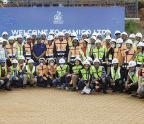
“WHAT ARE YOU LOOKING at?” Dr Agnes Kalibata asked the young businessman standing next to her at a summit in Kenya, who received a message on his phone and suddenly seemed very distracted.
“‘I am checking on my cows in the Ivory Coast’, he said to me,” says Kalibata, the renowned Rwandan agricultural scientist and policymaker and President of the Alliance for a Green Revolution in Africa (AGRA).
“Then he said ‘I installed solar cameras all around my farm, which is a side hustle for me, so that I can check on my livestock whilst I work here in Kenya’.
“For me, that's the future of farming!” exults Kalibata.
It all boils down to not just crops or copses, flower beds or bouquets.
It lies in the innovations being sown into the evolving landscape of agricultural technology or agtech/agritech.
And these agripreneurs don't mind getting their hands dirty either-beyond their smart business suits.
The opportunities for them are immediate and ripe for the picking.
“What we're seeing happening in the space, is a higher uptake of technology,” says Dr Mandla Mpofu, the Managing Director of Omnia's Agriculture Division, to FORBES AFRICA.
Ominia Group specializes in conducting research and development, manufactures and supplies chemicals and specialized services and solutions for the agriculture, mining and chemicals application industries.
“By technology I don't just mean the electronic side of it but also understanding the industry a bit better. So what I'm talking about here is understanding the soil, and working on improving yields. And then you have satellite technology being used and we're seeing artificial intelligence coming into this very, very exciting industry.”
Kalibata tells FORBES AFRICA that the agricultural sector has really been defined by the Fourth Industrial Revolution.
“There are specific moments in time that completely change how we think about business and how we do business,” Kalibata adds. “So specifically, this particular revolution, I would say, there's a real revolution happening from an agtech perspective…This is why there are so many new ways of looking at how agriculture can be done, all the way from how we generate the technologies that we use.”
One of the biggest issues Khadija Mohamed, founder of Kwanza Tukule in Kenya, encountered when she began in this industry was the food supply chain.
IN SUB-SAHARAN AFRICA ALONE, THERE ARE OVER 400 AGRITECH SOLUTIONS AND STARTUPS, ACCORDING TO A 2020 REPORT BY THE GLOBAL TELECOMS INDUSTRY LOBBY GSMA.
“It's really difficult to solve but can be solved. Also, the investments don't want to flow there. Investment wants to flow into things like unicorns or fintech. I mean, people have to eat. They will transfer money via mobile phones, they'll take loans, but if they don't have food, at some point, the priorities need to shift to focus on these fundamental things,” Mohamed explains.
Let's take a step back.
In 2022, the World Economic Forum estimated that there are well over 600 million smallholder farmers around the world working on less than two hectares of land. These farmers are estimated to produce 28%-31% of the total crop production and 30%-34% of food supply on 24% of gross agricultural area.
A further study done by the United Nations showed that the world population will reach 9.1 billion by 2050, and to feed that number of people, global food production will need to grow by 70%. For Africa, which is projected to be home to about 2 billion people by then, farm productivity must accelerate at a faster rate than the global average to avoid continued mass hunger.
In sub-Saharan Africa alone, there are over 400 agritech solutions and startups, according to a 2020 report by the global telecoms industry lobby GSMA. Agriculture makes up 35% of Africa's GDP and employs about half of its people, but the continent still imports billions of dollars of agri-products every year.
“From the outside, agriculture looks pretty dirty,” the CEO and co-founder of Khula!, Karidas Tshintsholo, says to FORBES AFRICA. “But I'm a numbers guy…Once I started looking at the numbers and saw that we [Africa] have most of the world's arable land, which is 60%, we are the ones [with] remaining arable land. Almost everybody on the continent is dependent on agriculture for survival.”
“I would look at agriculture in terms of the size of the opportunity,” Peter Njonjo, the CEO and co-founder of Twiga Foods in Kenya, adds.
The opportunities may look monetary but for a number of the agritechs, especially the ones we looked at for this feature, it's about two mutually exclusive yet different reasons-solving food security on the continent while becoming climate-resilient.
“The yields of certain crops in Africa have




